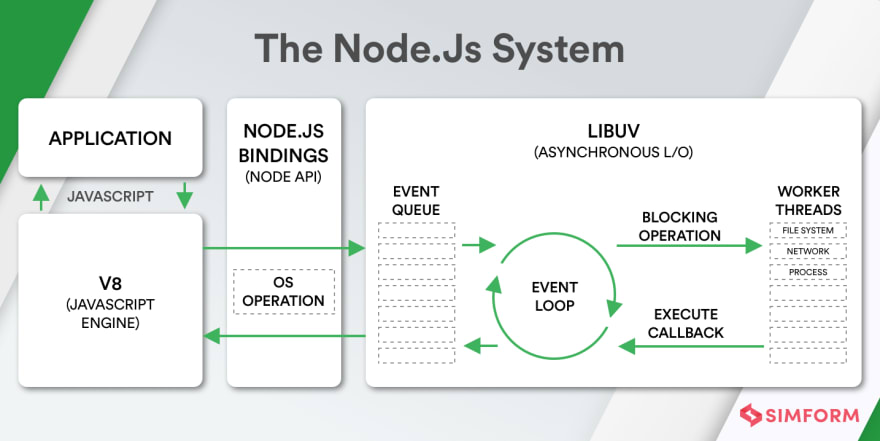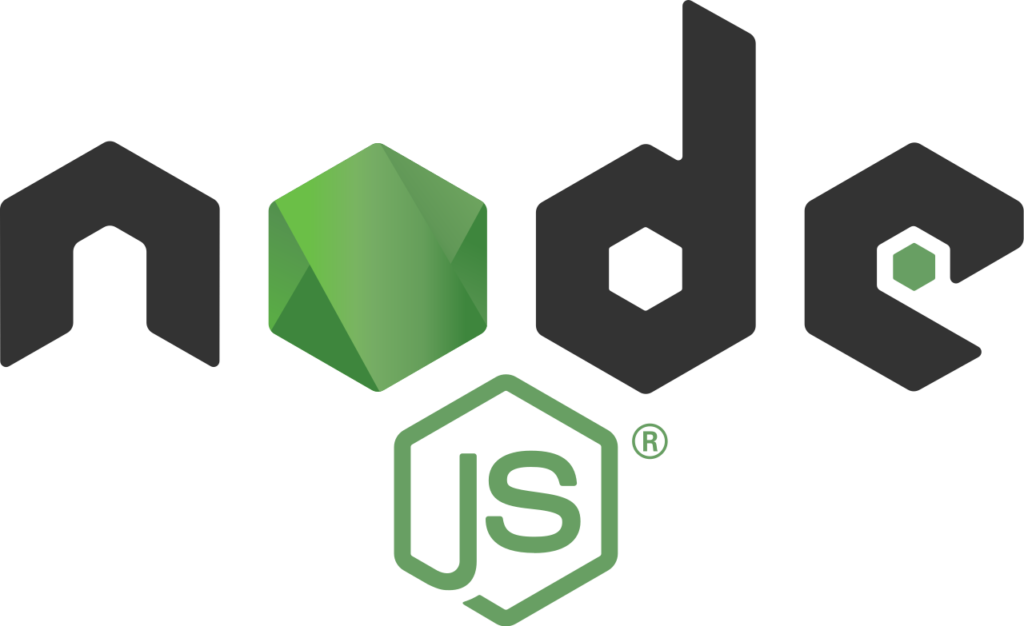Node.js – The Basics
Node.js was created in 2009 as a response to the limitations of traditional server-side technologies. Node.js is a powerful open-source, cross-platform, server-side runtime environment that allows developers to build fast, scalable, and highly efficient web applications using JavaScript as it is built on the Chrome V8 JavaScript engine. Node.js allows developers to write JavaScript code on the server-side, which makes it easier to develop both the client-side and server-side of an application in a single language.
As Node.js is a runtime environment for executing JavaScript code on the server-side, it does not come with a built-in web framework. However, there are many different third-party frameworks available that can be utilised with Node.js to help simplify web application development as well as providing additional features.
The following frameworks provide developers with a variety of tools and features to help build efficient, scalable, and secure web applications. They also provide a modular and extensible architecture, making it easier to maintain and extend the codebase over time.

Node.js Frameworks:
Expand each section below to learn more about the different third party Node.js frameworks that can be utilised.
 Koa.js is a web framework for Node.js that is designed to be smaller, more expressive, and more modular than other popular Node.js frameworks, such as Express.js. It was created by the team behind Express.js to address some of the limitations and shortcomings of the earlier framework.
Koa.js is a web framework for Node.js that is designed to be smaller, more expressive, and more modular than other popular Node.js frameworks, such as Express.js. It was created by the team behind Express.js to address some of the limitations and shortcomings of the earlier framework.
One of the key features of Koa.js is its use of async functions, which makes it easier to write asynchronous code in a more elegant and concise manner. Koa.js uses the ‘async’ and ‘await’ keywords to handle asynchronous operations, such as I/O requests and database queries, without the need for callbacks or promises.
 Express.js is a popular web framework for Node.js that provides a robust set of features for building web applications and APIs. It is designed to be flexible, scalable, and easy to use, making it a popular choice for both beginners and experienced developers.
Express.js is a popular web framework for Node.js that provides a robust set of features for building web applications and APIs. It is designed to be flexible, scalable, and easy to use, making it a popular choice for both beginners and experienced developers.
One of the key features of Express.js is its middleware system. Middleware functions are functions that take the request and response objects, modify them in some way, and then pass them on to the next middleware function in the chain. This allows developers to add functionality to their application in a modular and extensible way, making it easier to write maintainable and scalable code.
 Nest.js is a progressive Node.js framework for building scalable and modular server-side applications. It was inspired by Angular and uses a similar architecture, making it easy for developers who are familiar with Angular to pick up and use. One of the key features of Nest.js is its use of decorators to define modules, controllers, and services. This makes it easy to create a modular and extensible architecture, allowing developers to organise their code into reusable components.
Nest.js is a progressive Node.js framework for building scalable and modular server-side applications. It was inspired by Angular and uses a similar architecture, making it easy for developers who are familiar with Angular to pick up and use. One of the key features of Nest.js is its use of decorators to define modules, controllers, and services. This makes it easy to create a modular and extensible architecture, allowing developers to organise their code into reusable components.
Nest.js also provides a range of other features and functionality, including: Dependency injection, Middleware, Routing, as well as built-in support for WebSockets, OpenAPI and TypeScript.
 Hapi.js is a popular open-source framework for building web applications and APIs with Node.js. It was originally developed by Walmart Labs, and is designed to be modular, extensible, and developer-friendly. One of the key features of Hapi.js is its plugin architecture. Hapi.js provides a rich set of built-in plugins, such as authentication, validation, and caching, which can be easily integrated into an application. In addition, developers can create their own plugins and share them with the community.
Hapi.js is a popular open-source framework for building web applications and APIs with Node.js. It was originally developed by Walmart Labs, and is designed to be modular, extensible, and developer-friendly. One of the key features of Hapi.js is its plugin architecture. Hapi.js provides a rich set of built-in plugins, such as authentication, validation, and caching, which can be easily integrated into an application. In addition, developers can create their own plugins and share them with the community.
Hapi.js is a powerful and flexible framework for building web applications and APIs with Node.js. Its modular and plugin-based architecture, along with its range of features and functionality, make it well-suited for building large-scale and complex applications.
Why Node.js makes life easier:
Node.js is a powerful and versatile platform for building server-side applications with JavaScript. Its asynchronous and event-driven architecture makes it well-suited for handling high-volume and real-time applications, such as web servers, APIs, and streaming applications. Node.js also has a large and growing ecosystem of libraries and tools, making it easy for developers to build complex applications with minimal effort.
Overall, Node.js is a useful and popular tool for building fast and scalable applications, especially in the web development space.
Our Node.js Projects

Fitwins
The Fitwins application challenges and motivates people to increase their physical exercise through encouraging and rewarding challenges which allows people to virtually explore parts of the world!Learn More

BeMoto
Creating a time-saving bespoke automation system that allows BeMoto to analyse customer data and deliver targeted marketing.Learn More

